Changing Menus, Changing Lives
Image via Rachel Lorenz
University of Colorado Boulder Campus Dining Services offered vegan barbecue sandwiches on Oct. 4, 2017 during the Forward Food Leadership Summit.
“When you change menus, you truly change lives,” states Sara Brito, president and co-founder of Good Food Media Network, to a roomful of dieticians, nutritionists and chefs.
Over 50 foodservice professionals from Colorado universities, public school districts, and medical facilities gathered at University of Colorado Boulder on Oct. 4, 2017, to learn about providing plant-based options to the people they serve. The Forward Food Leadership Summit, hosted by The Humane Society of the United States and CU Boulder Campus Dining Services, featured experts in sustainable food practices, a cooking demonstration and an abundance of beautiful, delicious vegan food.

A vegan breakfast was provided by CU Boulder Campus Dining Services to the Forward Food Leadership Summit participants on Oct. 4, 2017, in Boulder, Colo. It included tofu “eggs” benedict with cashew “hollandaise” sauce on a potato-quinoa cake, French-toast flavored “panna cotta” and fresh fruit skewers.
Why focus on plants? Plant-based diets are good for human health. They have been shown to reduce the risk of atherosclerotic cardiovascular disease and aid in weight loss. They are being recommended by mainstream health groups such as the American Cancer Society and the American Diabetes Association.
According to the Centers for Disease Control and Prevention, over one-third of American adults are obese. “The American Diabetes Association estimates that diabetes costs $245 billion in direct medical costs and reduced productivity in 2012,” says Brito. “That’s money that could be redirected toward education or social services,” remarks Chef Mark Reinfeld, author of Healing the Vegan Way.
In addition to improving human health, plant-based diets are also good for the earth. Plant-based foods have a lower impact on the environment. They typically generate fewer greenhouses gases and require less water, land, and energy than animal-based foods, Reinfeld explains.
“Kids born in the year 2000 – many of them might die at a younger age than their parents because of what we feed them,” says Chef Ann Cooper, director of food services at Boulder Valley School District. Cooper is referencing a report from The New England Journal of Medicine on the potential decline in life expectancy due to the substantial rise in obesity in America.
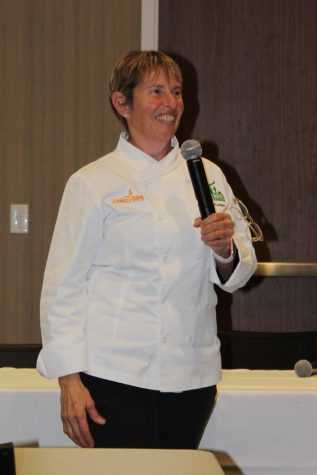
Chef Ann Cooper challenges and inspires participants of the Forward Food Leadership Summit on Oct. 4, 2017, in Boulder, Colo. “If we want to clean up our kids’ health, we can start with what we feed them,” states Cooper.
Although Colorado has the lowest adult obesity rate in the nation, the state is not a leader when it comes to children’s health says Cooper, an internationally recognized advocate of healthy food for children. Fourteen other states have lower child obesity rates than Colorado. “The adults have healthy weight by in large. Kids — not so much.”
“If we want to clean up our kids’ health, we can start with what we feed them,” instructs Cooper. Access to healthy food in schools is a good place to begin. Exposing children, college students, and hospital patients to plant-based foods allow them to make healthier choices. It can reshape the social norms regarding food and move the state’s health in a positive direction. Foodservice professionals from seven public school districts, six medical facilities, and four universities in Colorado came to this conference to learn how to do just that.
The morning speakers of The Forward Food Leadership Summit focused on meeting the growing demand for plant-based foods. Brito called the food professionals in the room “agents of change” and described their power to transform lives. Sandy Holmes, a clinical dietician at Aspen Valley Hospital, described her efforts over the past 25 years to create a plant-based wellness culture in her workplace. She says education is key to promoting change. Reinfeld shared his “template” for easily creating hundreds of variations of basic recipes – a method that allows cooks to break out of the “recipe trap” and create dishes based on what ingredients are available and what flavors are appealing in the moment.
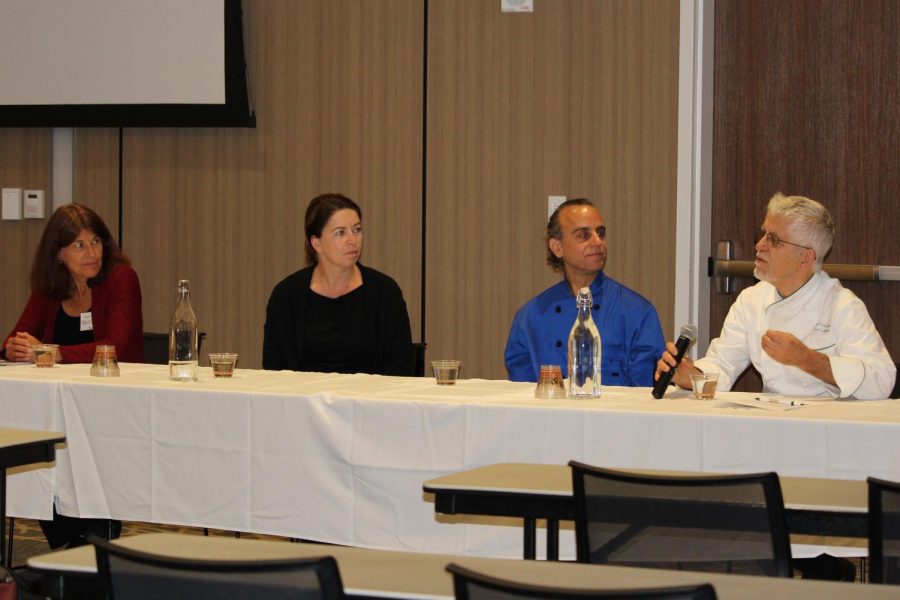
A panel consisting of Sara Brito, Sandy Holmes, Chef Mark Reinfeld and Chef Ron Picarski discuss meeting the growing demand for plant-based food at the Forward Food Leadership Summit on Oct. 4, 2017, in Boulder, Colo.
The afternoon speakers discussed how to successfully promote healthy options. Schools that Cooper works with have implemented a variety of ideas including school gardens, fruit and veggie tastings, farm-to-school programs and a food truck with lunch options cooked from scratch.
They hold Iron Chef competitions that challenge students to create new nutritious, cost-conscious dishes and get them invested in healthy eating. Karla Dumas, food and nutrition manager at Forward Food, discussed the success of Meatless Monday and Lean & Green programs in schools she’s worked with across the country. She notes the cost savings for schools as well as the health benefits for students. Forward Food offers free resources via their website as well as workshops and culinary training for school districts.

Chef Kevin Arthur of CU Boulder Campus Dining Services demonstrates how to prepare vegan barbecue sliders with coleslaw for the participants of the Forward Food Leadership Summit on Oct. 4, 2017, in Boulder, Colo. Cooked red lentils and shredded carrots are flavored with liquid smoke and barbecue sauce to make a hearty meatless sandwich.
Between the sessions, Chef Eliah Golden and Chef Kevin Arthur of CU Boulder Campus Dining Services demonstrated how to prepare vegan barbecue sliders with coleslaw. The sliders were offered to students, faculty, and guests at the Village Dining Center. This center is CU Boulder’s newest dining venue and boasts six sleek food stations – all of which converted completely to vegan cuisine for the day.

A vegan chocolate cupcake from the dessert station in the Village Center Dining Hall on Oct. 4, 2017, in Boulder, Colo. CU Boulder Campus Dining Services prepared vegan food exclusively in the dining hall on the day of the Forward Food Leadership Summit.
If you’re interested in a healthier, more plant-forward diet, Forward Food recommends setting a new goal or two for you’re yourself. Consider,
- replacing one, two or even four of your meat-based meals each week with completely plant-based meals.
- meeting with the director of the dining service where you work or go to school to discuss developing a plant-forward menu.
- learning more about the environmental impact or the health aspects of your food choices.
- pledging to go meatless on Mondays.
For help getting started, The Human Society of the United States (HSUS) offers a free guide for meat-free meals online. In addition, the internet is full of plant-forward recipes. Find free recipes online here and here and here. Or do a quick search on Pinterest.
Institutions interested in incorporating more plant-based meals into their menus can find resources at Forward Food or by contacting Regan Karlsen, Colorado Outreach Coordinator for HSUS.
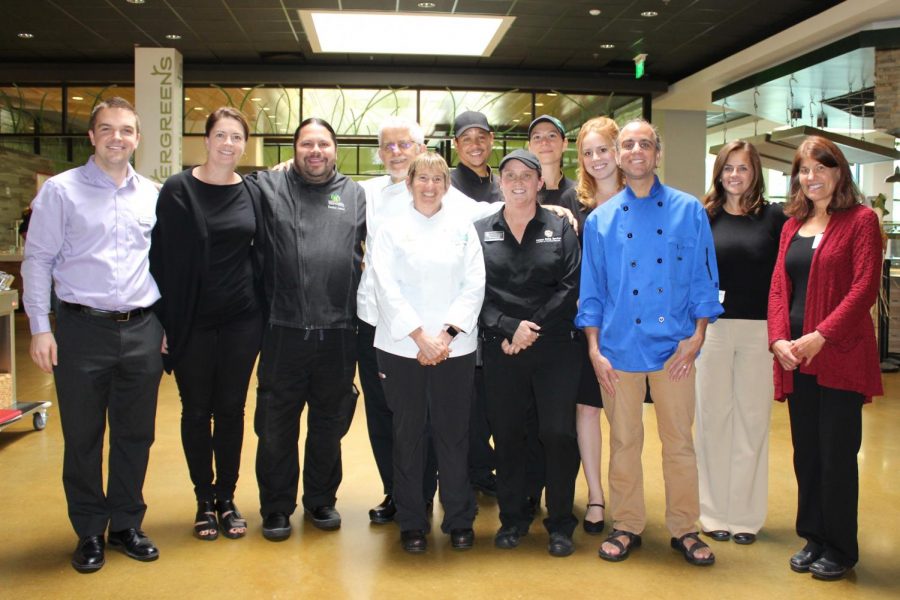
Humane Society of the United States Events Coordinator Sean Hennessy, Good Food Media Network President Sara Brito, River and Woods Executive Chef Daniel Asher, Eco-Cuisine Founder and Chef Ron Picarski, Boulder Valley School District Director of Food Services Ann Cooper, CU Boulder Campus Dining Services Executive Chef Kevin Arthur, CU Boulder Campus Dining Services Executive Chef Kevin Arthur, Village Hall Dining Center General Manager Jill Patterson, CU Boulder Campus Dining Services Senior Executive Chef Eliah Golden, Humane Society of the United States Colorado Outreach Coordinator Regan Karlsen, Vegan Fusion Chef Mark Reinfeld, Humane Society of the United States Senior Manager Karla Dumas and Aspen Valley Hospital Dietician Sandy Holmes gather for lunch at the Forward Food Leadership Summit on Oct. 4, 2017 in Boulder, Colo.
The next Forward Food event will take place in Monterrey, Calif. HSUS has hosted 35 Forward Food Leadership Summit events nationwide.







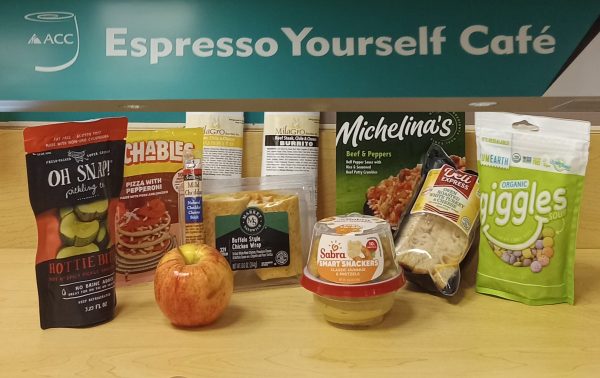




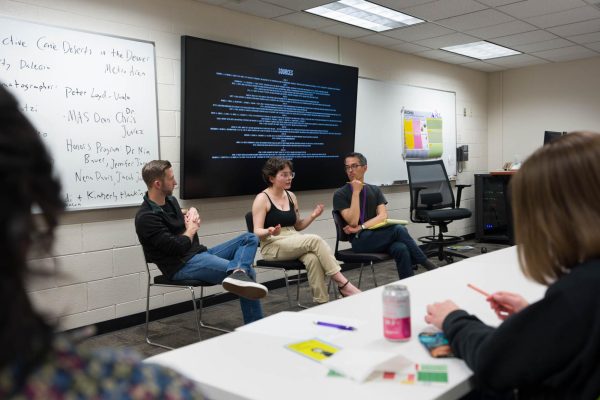

Meredith Tofield • Nov 8, 2017 at 11:05 am
Very good article Rachel! The only thing I worry about is eating plant-based food that is non-organic. I shy away from organics because of the cost. So is eating non-organic fruits and vegetables going to harm my kids’ health in the long run? I suppose it’s better than fast food, but could cause other (cancerous) problems ?
Thanks.
Rachel Lorenz • Nov 11, 2017 at 9:25 am
Hi Meredith-
In a perfect world, everything we eat would be local, organic, zero-waste and affordable. In my perfect world, anyway.
Alas, that is not our current reality. Organic produce is generally more expensive than its conventionally grown counterparts, and this factors into most consumers’ purchasing decisions. Are you familiar with the Environmental Working Group’s “Dirty Dozen” and “Clean 15” lists? These lists can help you decide when to buy organic and when to skip it. The blog post “If You Can’t Buy Everything Organic” by 100 Days of Real Food has a quick explanation of the lists.
Are non-organic foods going to harm you kids’ health in the long run? I’m not an expert and don’t have the room in this comment section to do the subject justice. But, yes, a conventionally grown plant-based diet is better than a fast-food diet. To quote the article above, “It’s better to consume conventional fruits and veggies as opposed to none at all!”
Thanks for reading my article and for asking yourself the tough questions regarding food and health.
-Rachel
Diane Shepard • Nov 4, 2017 at 7:13 pm
I love all that Ann Cooper has accomplished in the BVSD kitchens. I’d also like to read about the services the schools (BVSD and local colleges) have for students who have food intolerances. Can this program, that may include cooking from scratch, be utilized to creatively prepare meals for students no matter what they can and cannot eat due to chronic health issues?
Rachel Lorenz • Nov 11, 2017 at 8:53 am
Food intolerances were not discussed at the Forward Food Leadership Summit so, unfortunately, I do not have any additional information on this subject for you. How schools handle food intolerances might be an interesting future article though. Thank you for the idea, and thank you for reading.
-Rachel